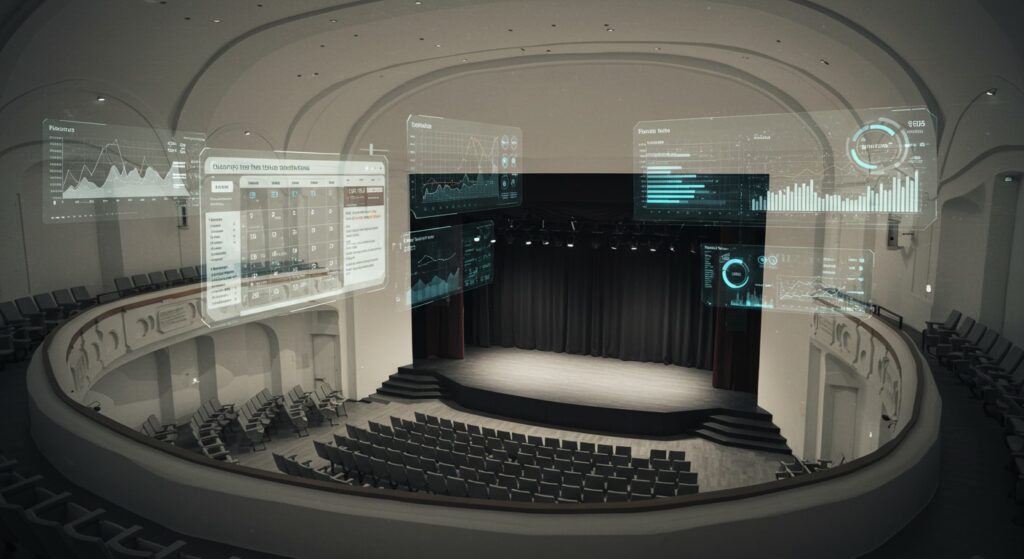
How to Set S.M.A.R.T. Goals for the Growth of Live Music Venues
The complexity of today’s live music world can feel overwhelming for even the most tried and tested industry insiders. Venue owners have to navigate an increasingly challenging marketplace, all while finding new marketing opportunities and operating leaner. Mapping out an achievable plan has never been more critical for music venues hoping to thrive in the competitive landscape we find ourselves in.
There are no guaranteed routes to success, but there are some general business principles and approaches that work in a wide range of industries. Forming S.M.A.R.T. goals is one of them.
With interest in live-music events finally returning to pre-pandemic levels, there is plenty of incentive for outlining a path to success. By outlining specific, measurable, achievable, relevant, and time-bound goals we can have a much clearer picture of how we can grow. We’ve put together a guide to setting S.M.A.R.T. goals to help live music venues.
Be specific with goals
Getting specific with goals means identifying the who, what, where, when and whys, and defining a path to get there with progressive steps. Being as specific as possible will also reduce risk by forcing you to ponder key questions before you get started.
For example, if you’re looking to increase your number of events by 15% over the next 12 months, exploring how, why and when brings up some important discussions. Why 15%, and how will that impact your revenue and budget for the following year? Will you have to hire more permanent staff, or can you hire temporary staff ad hoc? Do you need extra budget for these shows and how will you get it? Will you need to work with other promoters? Do you need new internal processes or a way to automate and integrate financials?
Without this kind of strategic approach, you risk heading in the wrong direction, running into a lot of walls and wasting valuable time and money to solve problems that could have been avoided.
Related: Standing Out in Crowded Live Music Venue Markets
Fine-tune the details
Particularly in a tight labor market, venue owners and managers need to plan well ahead to make sure they have enough hands on deck come show time. Finding out at the last second that more workers are needed is an easy way to derail a plan. By identifying and addressing as many details as possible, a venue owner or manager will be better positioned to evaluate and seize new opportunities.
Set measurable goals to track progress
If you can’t measure it, you’ll have no idea if your efforts and dollars are worth the investment. Some goals are more challenging to measure, but you need to find some metric that indicates your progress. An easy goal to measure, for instance, is reducing audience no-shows. Sure, they’ve paid for their ticket, but the real profit comes from in-venue sales, like beverages and merchandise. Driving down no-shows has been an important battlefield for venues – particularly independent venues, many of which are still struggling to bring attendance back to where it was in 2019.
It’s a straightforward process to tally the number of fans who buy a ticket but don’t actually make it to the show. If a venue had a 30% no-show rate in 2022, aiming to cut that number in half gives you a measurable goal to work toward. Determine how you will reduce no-shows, what you’re success rate will be, and how you plan to measure it.
A more challenging goal to measure might be to increase consumer awareness of your venue, especially if you are promoting lesser-known artists. How do you measure awareness? There are countless marketing tools to help with this, but it typically involves things like setting up alerts to know when your venue or shows are mentioned online, customer surveys (asking current customers how they found you) and general social media engagement.
Related: Effective Live Music Marketing Ideas for Today’s Concerts
Measure, work towards your goal, then measure again to see if your efforts are making an impact. You may find that it’s time to pivot to another strategy.
Make goals achievable
For some, it’s easy to get stuck dreaming of lofty goals that have little hope of being achieved. And once you start to pursue these goals, you’re more likely to give up because you never seem to reach any type of success. It’s much more effective to set a tier of goals based on achievability.
For instance, set small goals you are confident you can achieve with the resources and capabilities you have. Then, set larger goals that challenge you but are defined and achievable if you complete the smaller goals first. Finally, dream big and set goals that are far-reaching but still attainable if you achieve your larger goals and have people, tools, and timing working in your favor.
Start with the lowest-hanging fruit and knock out the easier goals. This strategy builds your confidence and momentum to tackle the next-level goals. Let’s take our example of cutting the no-show rate by half.
One way that many prominent music venues are successfully improving this is through newsletters. Newsletters are often where venue managers find the most regular and reliable attendees. It can also be a terrific place to build awareness and buzz for lesser-known acts, which can come in handy for a venue looking to improve its no-show rate. Newsletters are likely a first-tier, achievable goal.
As you move up the ladder towards some of your biggest goals, you’ll encounter roadblocks and find yourself needing much more time and additional resources. Don’t be discouraged. Instead, see it as a longer journey. If these large goals get really uncomfortable and overwhelming, break them down into smaller more achievable ones and tackle them one day at a time.
Related: A Quick Guide to Concert Budget Breakdowns for Music Venues
Determine if a goal is relevant
While it’s natural to want to jump aboard the latest industry trend, it doesn’t mean it’s appropriate for every venue. Live-streaming is all the rage right now for obvious reasons, and it can be an excellent way to earn new revenue and reach a wider audience. But does every venue need to focus on streaming shows?
Some venues will be perfectly suited to capture the vibes of a live show, but other venues may need to be experienced in person. Before spending money on hiring personnel and adding equipment with a focus on live-streaming shows, venue owners need to make sure that it’s the right and relevant move.
Stop and think about the relevancy of a strategy before committing resources and funding. Is your target audience looking to live stream your artists? Could you attract new customers if you offered it? What is the size of that opportunity? Will you make a profit and charge, or will it be part of your marketing strategy? Look at the big picture and determine why you are setting the goal. If the goal is relevant to your business’s stage of growth, your target audience, your budget, and your revenue strategy, then it’s worth being set.
Time-bound goals
Goals without a timeframe tend to be the same goals that keep getting put off and are rarely achieved. A deadline places a sense of urgency on the execution. The urgency may not be truly “urgent,” but there is at least a time constraint, so the goal is at some point prioritized.
When you have a list of goals, prioritize them and place what is important and urgent at the top of the list. Consider dependencies for each goal, such as costs, personnel, required processes, etc. Remember that your timetable may be at the mercy of others, but if you set a deadline, you can follow up to keep the momentum going. Deadlines also create accountability for you to act in a timely manner. Otherwise, some of your goals will die on the vine simply from neglect.
Supporting your S.M.A.R.T. goals with the right music management platform
Starting with a simple, cohesive plan can be a gateway to achieving big goals in live music. To pull together the many elements of a successful plan, venue owners are turning to management software that can help with the workload. Prism is a single-source solution designed for live-music venues, promoters and booking agents. To see how our software can help you get organized, increase efficiency, and reach your goals, contact Prism to schedule a demo.

Matt Ford is the founder and CEO of Prism.fm, an Austin-based software company revolutionizing live music event management. With a background in entrepreneurship and a degree from the University of Wisconsin-Madison School of Business, Ford combined his self-taught coding skills with firsthand experience as a concert promoter to address the inefficiencies he observed in the industry. In 2018, he launched Prism.fm, an all-in-one platform designed to streamline operations for venues, promoters, and agencies by replacing cumbersome spreadsheets with integrated tools for booking, financial tracking, and contract management. Under his leadership, Prism.fm has grown significantly, achieving $3 million in annual recurring revenue post-COVID and securing over $15 million in funding . Ford’s commitment to building user-centric solutions has positioned Prism.fm as a trusted partner for over 1,500 venues and promoters worldwide.


